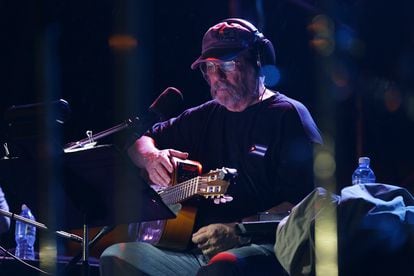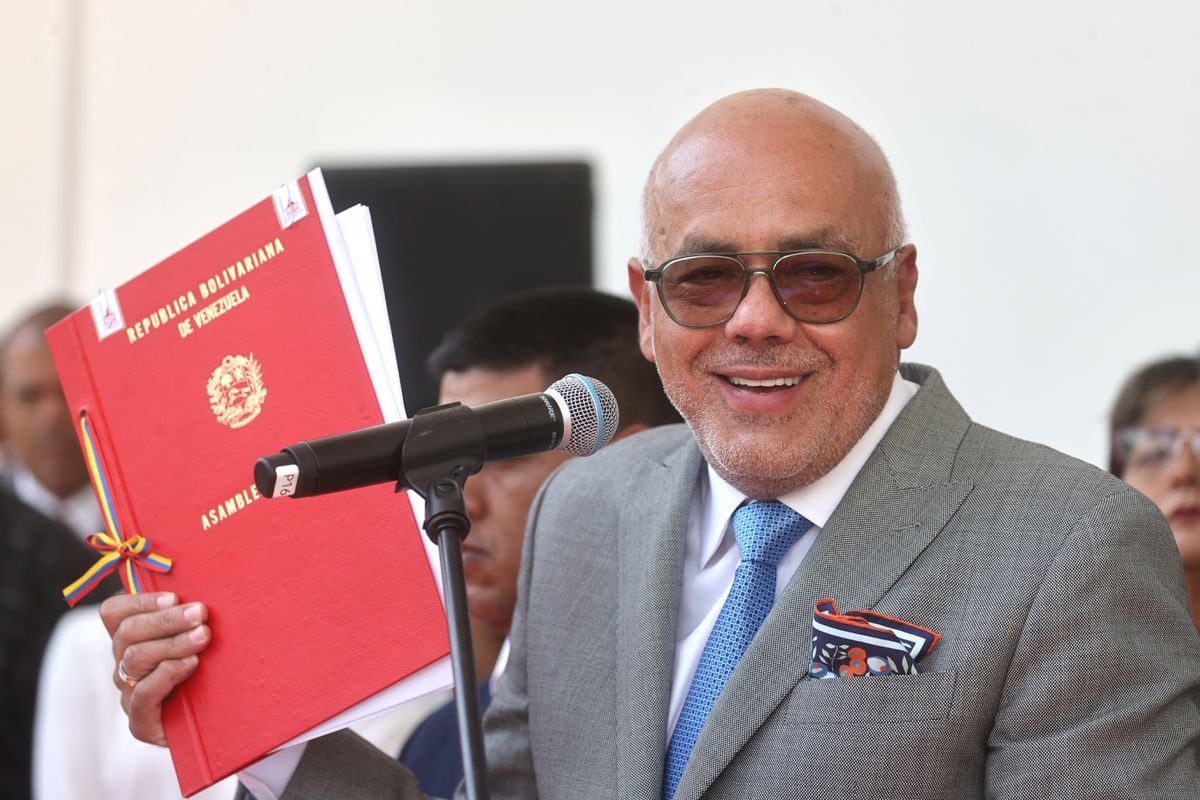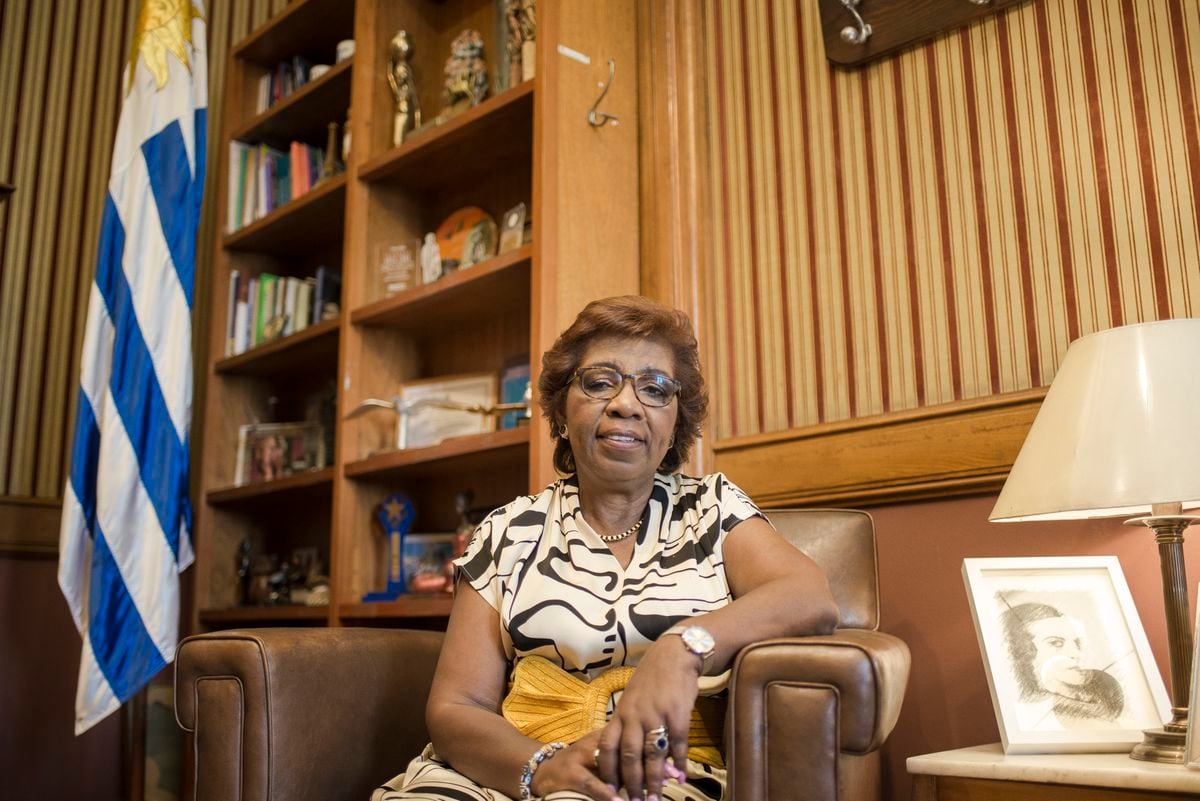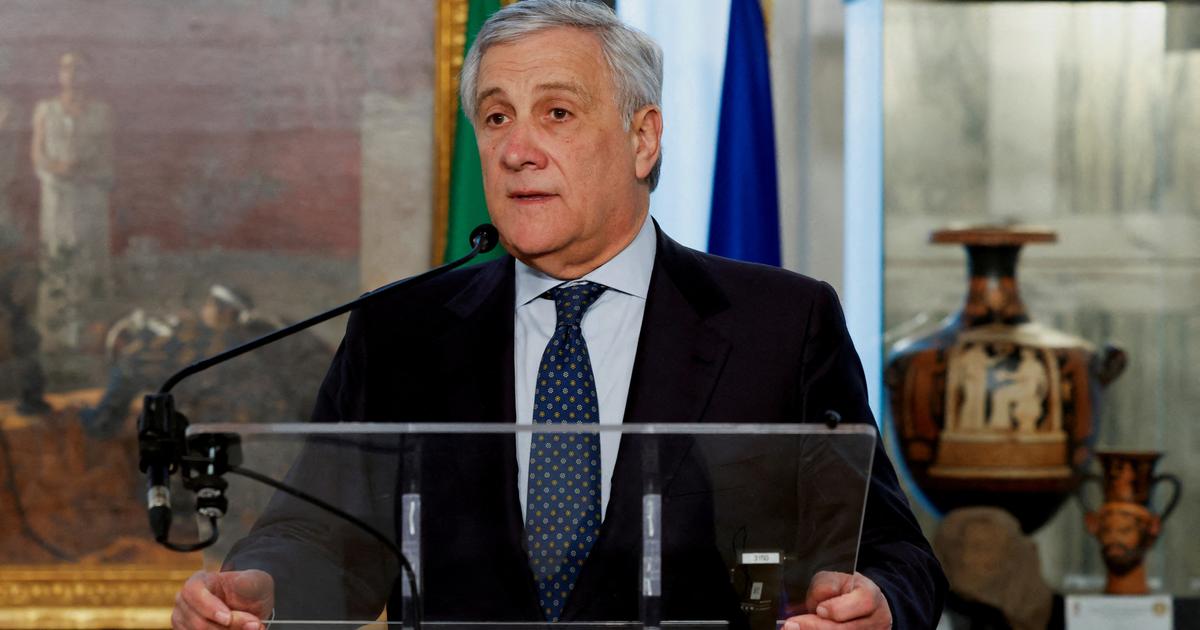Silvio Rodríguez poses for a photo in Havana on April 3, 2019 ADALBERTO ROQUE / AFP
Silvio Rodríguez was born 74 years ago in the small Havana town of San Antonio de los Baños, the place where the protests against the Government began on Sunday, July 11, which quickly spread across the island, causing an unprecedented political upheaval.
The Cuban singer-songwriter, who considers himself part of the revolution and denounces the role played by the United States and its policy of suffocation in the worsening of the crisis in his country, believes that what happened marks "a before and after" and that the authorities They should respond with immediate economic measures, many of them delayed without justification, and also by opening political spaces for all citizens to express themselves, especially young people.
He declares himself in favor of dialogue and against "the extremes."
More information
Trials for the 11J protests polarize Cuba
Silvio Rodríguez: "The Cuban people must have more participation"
Question.
How did you feel when you saw the July 11 protests, and the police response?
Answer.
First of all, sadness.
And not only because it is an unusual event in Cuba.
It has happened in the worst possible scenario: a global pandemic not yet controlled, which kills daily, which requires distancing measures that were being massively violated.
On the other hand, in a particularly unfavorable economic outlook - due to the pandemic, of course - and, for my country, also, for 62 years of a blockade that has been very damaging;
to top it all increased by 240 extra choking measures that the Trump administration imposed on us and that Biden maintains to this day.
Suddenly we were joined by too many cruelties and misfortunes.
Regarding the police action, in the first demonstration, which was in San Antonio de los Baños, there was no response.
The protesters marched through the main streets, past the municipal government headquarters, in front of the Party and even by the police.
There was no repression there, although later, in other cities, there was.
A repression that, because it is Cuba, is amplified, although we know that some who point us are used to seeing much more brutality in their own countries.
Of course, I categorically affirm that I am against all kinds of abuse.
“As it is Cuba, the repression is amplified;
some who point out to us are accustomed to greater brutality in their countries "
Q.
Does what happened mark a before and after, or is it another "chapter" of the revolution?
R.
I think it is a before and after because of the unprecedented nature of the event for us.
I don't think it's "one more chapter";
It is something serious that leads us to reflections and I hope to immediate measures.
In Cuba we live in a situation of social stress that is increasing and I am aware that it is not only the fault of the blockade.
For years economists, political scientists and citizens have been complaining about announced economic measures that have inexplicably not been put into practice.
All that delay is also responsible for what happened.
Q.
Why do you think that young people like the playwright Yunior García, one of the detainees, with whom you met days ago, say that their generation for a long time is no longer considered part of the process?
What is broken?
"The Cuban people have written exemplary pages of resistance, but they have also gone through decades of hardship and scarcity"
A.
No one can speak for an entire generation, not even a 39-year-old like Yunior.
Although it is also true that some - not only from his generation - have come to think that they have no future in Cuba.
Contradictorily, those who think this way have been trained in our universities.
I remember 30 years ago, when I was trying to convince the government of the need to build recording studios with state-of-the-art technology, one of my arguments was the number of good musicians who graduated from our schools and the insufficient infrastructure that awaited them in working life .
From then until today, economic conditions have become more precarious.
Everyone knows that in Cuba it is difficult to acquire anything that has technology from the United States (the blockade prevents it).
Professions that require a certain material base, even if it is minimal, are condemned to limitations.
I think that all this, although it does not determine, influences;
it creates a kind of fatalistic feeling about a tight future, whereas in other parts of the world this is not the case.
And the truth is that when you are young you think that you will not have the ugly part of the adventure but the reward.
It is part of the illusion of coming into the world.
The Cuban people have written exemplary pages of resistance, but they have also experienced decades of hardship and scarcity.
Silvio Rodríguez during one of the concerts in the neighborhoods of Havana before the pandemic.Gabriel Guerra Bianchini
P.
Many young people have been asking for a long time for dialogue and spaces to express themselves and disagree (something that has not happened so far), which in a way implies that they are willing to contribute to a solution if they are listened to. Is there hope, or too much time wasted?
A.
Not only young people: also many experienced people are willing to contribute to solving problems. Among them, not a few brilliant economists. For my part I have hope and I believe in young people. I am like that because there were people who believed in me when for others I was a problem. All generations bring something of their own: languages, demands; all generations bring their dose of continuity and also of rupture. It is their need to plant a footprint; it is a natural impulse and, at times, it is the revolutionary thing that shakes us up and propels us forward. I am completely in favor of dialogue. Do we not dialogue with the superpower that mistreats us in deed and in word? Why would it be difficult to dialogue with a part of ourselves? We must listen to all voices, and much more to our own.
"We have always thought that the attention to the neighborhoods should be systematized, made daily"
Q.
In the poorest neighborhoods that you know, obviously the hardships experienced are the basis of the malaise that caused many people to take to the streets, mostly young people. What should be done from power to contribute to the solution of the problems?
R.
I was more than 11 years doing concerts only in the neighborhoods. A year and a half ago I had to stop, due to the pandemic. We did it because of the enormous need we saw. But we've only given what we can give: music, and that's only part of what people need. Not even the documentary we promoted,
Canción de Barrio
, was shown on television. And we have always thought that the attention to the neighborhoods should be systematized, made daily. We have been saying and doing it for three decades.
At the beginning of the Revolution there were very effective plans with the marginal neighborhoods.
The first inhabitants of East Havana came from old subhuman suburbs.
Until the 1970s and 1980s that plan worked.
I suppose it was from the nineties when that attention waned, surely due to the economic downturn that meant the end of the socialist camp.
Now we are economically in a very complex situation, and just a few days ago some measures were announced to begin to meet the needs of the hundreds of thousands who live on the outskirts of some cities.
At this time it seems that they are beginning to reconsider or to carry out measures that were very necessary.
"One supposes that the changes have been delayed by currents of thought more attentive to the old manuals of socialism than to reality"
Q.
Is it enough only with economic measures, or are political changes also necessary?
R.
In my view, we need above all measures that streamline the productive-economic flow, which in itself means political adjustments. Resolution 320 has just come out, which eliminates price caps. That will stimulate production and it will also highlight inequalities, but I see it as a necessary measure. Of course, it will also mean more relief work for the government. The most incredible thing is that many of the necessary changes have been approved two congresses of the PCC [Communist Party of Cuba], and also endorsed in our recent Constitution. One supposes, since it has not been explained, that these changes have been delayed by currents of thought more attentive to the old manuals of socialism than to reality; they are also held back by a wealthy and indolent bureaucracy.
Q.
The summary trials against the detainees are now underway. You have called for the release of peaceful protesters who did not participate in violent events. In these days there have been dozens of sentences to more than a year in jail, and some of those arrested have denounced police abuses. What do you think about what is happening?
R.
I made that request public and I support it.
In fact, many have already been released.
I don't know about legal issues and I spoke with a lawyer friend to clarify myself.
In the first place it is obvious that the capacities of our legal system were oversaturated in a few hours.
That explained the summary judgments that, they tell me, we inherited from a 19th century Spanish law.
The penalties for summary trials are usually fines.
When they become a prison, the resource becomes more critical, due to the need for guarantees.
By law they cannot exceed the year of sanction.
These are non-serious crimes.
Fidel Castro and the singer-songwriter Silvio Rodríguez, in an image from 2004.EFE
P.
The official line is that there was no "social outbreak", and that behind everything that happened is the hand of the United States and the extreme manipulation of social networks to promote destabilization.
They insist on describing the majority of the protesters as criminals, mercenaries and "confused", do you agree?
"I do not share the schematic qualification given to the protesters"
R.
My criterion is that most of the protesters are people saturated with multiple anguish and discomfort, stressed by a year and a half of pandemic, by a drastic decrease in tourism (our main source of income) and by the severe cut in remittances imposed by Trump. Some measures, like putting the best-stocked stores in MLC, have been downright unpopular. In short, I do not share the schematic qualification given to the protesters, although the videos show that among the heterogeneous mass there were also cases of vandalism. I found a case of violence against a maternal and child hospital in Cárdenas particularly reprehensible.
For my part, I can testify that on the Sunday of the protests I received on my blog a growing number of instructions that came online, guiding people to take to the streets.
They said that cities had been built, that governments had surrendered and that power was in the hands of the rebellion.
They upload fake photos.
It was crazy, but some evidently believed it.
Undoubtedly that is how the outbreaks of protest were coordinated in several places at the same time.
“I have never pretended to be an example of anything;
I have enough with making songs "
Q.
This is a moment of extreme polarization, and from the extremes those who ask for equidistance are contemptuously accused of being "centrists". After 62 years of revolution, can things be resolved without dialogue and centrism? Could what you did when meeting Yunior be the beginning of a path, if the authorities pick up the gauntlet?
R.
One day I woke up and saw that there was a public letter [from Yunior] inviting me to a dialogue; I accepted it. If the invitation had come to me privately, I would have done the same. I have never claimed to be an example of anything; I have enough with making songs. The centrist thing doesn't scare me. The extremes are those that seem inadmissible to me. Without reaching the polarization that is seen daily in various parts of the world, what happened on Sunday, July 11, shook us, and without a doubt it should lead us to deep reflection. I suppose, I hope, that is happening at all levels.
I believe that if there is to be a single party in Cuba, it must be very open, inclusive, and ecumenical, even if it has strategic goals.
The country and its institutions are due to all citizens, not just to those who think in one way.
We all have the right to be respected, heard and cared for.
In short, I think that, as Cuba has been in health, it should be in everything else.
Discover the best stories of the summer in
V Magazine
.


/cloudfront-eu-central-1.images.arcpublishing.com/prisa/SD3Q2KTBUSGIOPJPYSBCVXIRXY.jpg)



/cloudfront-eu-central-1.images.arcpublishing.com/prisa/DC3ZMRIO3VE7ZCP4SMINQMIKIY.jpg)


